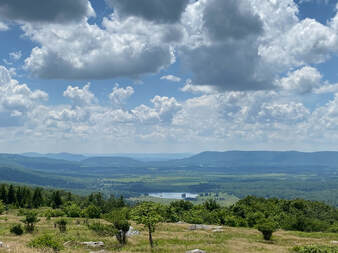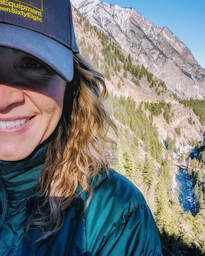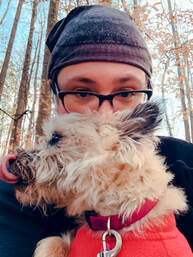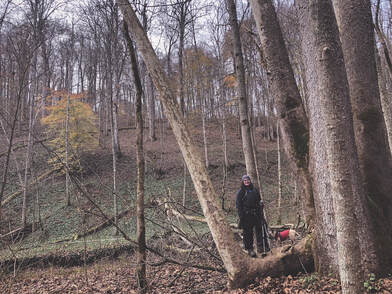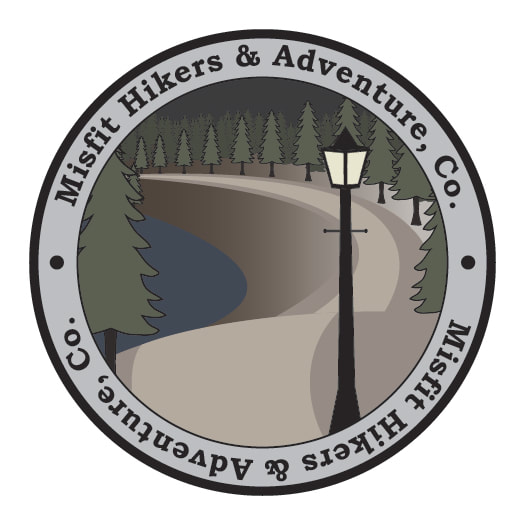|
Who wants to miss out on views and experiences like this, all because they can't find someone to go with them? There's already enough obstacles so many face in getting out to enjoy the outdoors, why should our fear of being alone and what could happen be one of them? Last post I wrote about the fear of being out there, and that the chance of being attacked (by a person) on the trail was actually extraordinarily low. But when you're out alone, there ARE some precautions you can take to help keep yourself safe - against people, loose dogs, injuring yourself, etc. (note: always read up on the wildlife on the area and prepare accordingly). So read on for some of my own tips and tricks, as well as some from my readers as well!
DO: - Step off the trail when possible to let folks pass, so you have full view of them. - GPS/Life Link through All Trails - I have a Garmin InReach, which has an SOS button which summons search and rescue, and I can text my family (with coordinates) when I don't have cell service. This is GREAT if you hike alone, where the danger of twisting an ankle or falling means you could need some help. - A lot of people said get a dog - this is an inbetween for me. Dogs can be a great protector, but they can also cause problems if in a dangerous situation (I'll do a separate post about this). I have a dog. I'd rather take my chances than leave my boo home. - Mace/Pepper Spray/Bear Spray - I carry bear spray now at all times, because loose dogs. It's in a holster on my belt. If you carry mace or something similar, then keep it handy - around your neck, wrist, etc. NOT in a pocket, and PRACTICE pulling it out! - Use hiking poles - not only will they save loads of strain on your back and knees, but handy to beat away dogs. They also keep you from slipping and injuring yourself. - Trust your gut - if you feel uncomfortable, get out of there - Take a self defense class - Carry a weapon - if you're going to carry a weapon - from bull whip to knife to gun to stun gun - you need to be experienced in its use. A few hours at the range doesn't count. I mean, I saw a dude running on rocks with an ax at Dolly Sods. Don't do that, my guy. In fact, because it gives you a false sense of security, you may ignore other safety measures that have significantly more impact. - Snap a pic - sometimes I'll be in a parking lot and there will be someone waiting in a car, which is normal but always weirds me out, so I casually snap a pic of them/license plate and send to husband. - Tell someone where you are going and when you should be back. EVERY TIME. - Find a way to quiet your mind - Look, a lot of the fear you feel out there about being alone and what can happen is just that...fear. It's gonna hamper you, and the anxiety can be intense. Find a way to distract yourself - I listen to books on tape (no earpods or just one!!). There's music, talking to yourself, reciting a poem over and over (mine is "he thrusts his fists against the post and still insists he sees the ghost). DON'T: - Don't wear earbuds - or only one earbud - you need to be aware of your surroundings. - Don't be afraid to move on from a conversation - you don't owe anyone anything on the trail. If you aren't comfortable showing a solo-guy on a map where you are, then don't. - Don't randomly meet up with someone from the internet, because you think hiking with a stranger is safer than hiking alone. Even if a woman, be careful, do your research and meet up ahead of time to check them out. JUST BECAUSE THEY ARE FEMALE DOES NOT AUTOMATICALLY MEAN THEY ARE A SAFE STRANGER. - Don't park next to cars in the parking lot if you can avoid it. And ALWAYS be aware of your surroundings in the parking lot. Don't be distracted here. The chance of being injured by someone on the trail is extraordinarily low. SO LOW. When I say low, I mean LOW. I had trouble finding any cases at all - really only a handful. Folks are more likely to run in to someone in the parking lot (STILL very very low). Folks are definitely more likely to encounter a loose dog or trip and fall. Be prepared for those situations. In the end, the more you do it, the more comfortable you'll be. It's natural to feel scared and unsure in the woods - we're taught that being alone is a bad thing and from the time we're kids that the woods hold monsters. Coupled together and WHAM! But while you should be careful and respect your surroundings, you shouldn't let it stop you from getting out there. If I - who has an imagination that goes WILD - can hike in the dark and even do solo trips - can do it, then YOU. CAN. TOO. Any other tips and tricks of the trade? I know there's more!
1 Comment
“I was always very active, ate well, etc. I never thought I'd experience challenges and setbacks regarding my health. However, in 2013, I had my first, major intracerebral hemorrhage. It was caused by a CVA (cavernous amgioma) or CVM (cavernous malformation). A CVA is a cluster of blood vessels that leak through their own walls. Mine was located deep within my brain, in an area my neurosurgeon called "high real estate". Surgery was too risky. We hoped that this would be a one time event. Unfortunately, I had several more bleeds and another major hemorrhage in 2016. To save my life, they had to operate. I am extremely fortunate to be alive despite my cognitive and physical deficits. I'm in pain continually. But nature is my therapy, and I get out as much as I can. My advice? Accept help. Much love to all misfit hikers out there!—Dana, (@mrs.hangle).
. Pronouns: She/Her . Dana would like to give a shout-out: I am not affiliated with a group, but one thing I feel strongly about is the appropriation of Indigenous traditions and ceremonies in ecotherapy. I would just encourage people to refrain from partaking in cultural activities, which are not their own. Don't be taken financially and emotionally by people claiming to be able to use Indigenous events in nature if they are not Indigenous themselves. In kindness, Dana The pain is just in your head...that's how I felt when I went to the Cleveland Clinic downtown ER just over a week ago. The doc implied I was in pain because I was fat, had over-exercised, or that I was simply drug seeking. It was such an awful experience that I wanted to see if I was the only one. I felt very much alone and I started to doubt myself which I rarely do. Then I started reading. And holy shit. Sorry not sorry for the length of the post. It's important shit, and if it's 400 words over what people will typically read, well, if you can make it through a Stephen King novel, you can hopefully hang on long enough to make it through here.....
This isn't made up - it's a valid problem, as reported on by the NY Times, Harvard Health, and the Washington Post. So what's happening? Well, unfortunately, if you aren't a white cis male and in pain, good luck:
Why? Why does this happen? You can't ignore that white cis men have certain societal privileges, leftover from a thousand years of being the top dogs. I have nothing against white cis males - my problem is with the people that afford them the privilege at the expense of others. There's a historical connection that can't be ignored - for example, studies have shown in the case of women, doctors are much more likely to assume women’s pain is caused by emotional issues and/or hysterics rather than rooted in actual physical causes. EVEN WHEN CLINICAL TESTS CLEARLY DEMONSTRATE THEIR PAIN IS REAL AND IDENTIFIABLE. Not only that, but women with emergent or chronic pain are much more likely to be misdiagnosed as having a mental health issue and prescribed anti-anxiety or psychotropic drugs. I guess that's progress from the forced masturbation doctor's prescribed in the 1800s. Additionally, lady folk with biologically female issues in the ER and out of the ER, who complain of pain associated with fibroids or endometriosis are still often dismissed in high numbers as having pain “normal to being a woman.” It boils down to doctors believing women are more emotional and irrational than men, and so over exaggerate their pain, if they are actually having pain at all. This isn't anecdotal - Karen Calderone, for example, found doctors tend to treat men and women differently when they’re in pain, even when they exhibit the same symptoms. And they’re given sedatives instead of pain-managing drugs. Because the pain is in their head and will go away if they get their hysterical vaginas under control. WTAF. The internalized discrimination is immense in the medical community. In 2016 nearly 50% of those medical students and residents surveyed believed at least one myth regarding race and pain – like believing black people had nerve endings that are less sensitive than whites. Uh, what? Like, what the what? Doctor’s also erroneously believe that women and persons of color are more likely to become addicted to painkillers, because they’re more likely to abuse them. And these are only a few examples. If you’re attractive? Ha. Good luck to you. The ER is one place that shit will work against you. Why? Because is you’re pretty on the outside, it means you’re healthier on the inside and therefore you’re less likely to be treated for serious health issues. Yikers. Basically, unless you’re a white, heterosexual male, you’re kinda fucked. Older? Told the pain is part of aging and to suck it up. LGBTQ? Hysterical. Children? Whiney. The list goes on. So what kind of ramifications does this have? The answer is….a lot. Medical research on women lags behind, and it's killing us - A study published in 2000 by The New England Journal of Medicine found that women were SEVEN TIMES more likely to be discharged from an ER in the MIDST OF HAVING A HEART ATTACK. Why? Because all the studies on heart attack symptoms are done on men and women have different symptoms. What about abdominal pain? Head pain? Back pain? Pain is an indication that something is wrong. Get the pain under control and then figure that shit out. Don’t send us home. Don’t ignore us. Don’t patronize us. When you do, we live in pain and illness much longer than necessary. Sometimes, it's never treated. Women and persons of color are also less likely to seek medical attention, out of fear of being dismissed or ignored. So the problem worsens. Or we just die. I run a group for misfits - those that don't fit the stereotype of the "typical" outdoor person. Outdoors adventures. Sometimes we're going to get hurt. Sometimes we're going to have chronic problems and/or pain. We also deserve to be cared for, to be treated in a fair and equitable way. When you don't, you further limit our access. Stop it. I posted what happened and I've now looked in to why it happened. Next up, what can be done? It's not enough to complain, I want to find solutions. What do YOU think people can do? What the solution is? Post below or contact me here. I was in the parking lot after a hike last week, when I took a step and as my father would say, that was all she wrote. My lower back exploded in pain. I managed to drive home, took some pills, and settled in for what I assumed would be an uncomfortable evening. But the pain kept increasing, and at 1:00 a.m. woke my husband up to take me to the downtown ER at the Cleveland Clinic.
Going to the Cleveland Clinic Main Campus ER was a big, big mistake and ended up being a traumatic experience instead of a healing one. They took me back quickly and a resident came shortly thereafter. His examination, moving everything everywhere, increased my pain intensely, but I'm sure it needed done in the manner he did it. He was confused because they'd put me down as having flank pain, not back pain. He asked a lot of questions about my hiking: Oh, you were hiking? First time out? You really hiked four miles? Are you sure you didn't fall? You hike how many miles a week? These were the gist, both then and when he came back later. It became clear he thought I was a fatty out for exercise above what I could do, probably the first time I'd been out in years, and had managed to hurt myself. I also got the feeling they thought I was drug seeking, based on the course of treatment that was yet to come and some of the off-hand comments that were made throughout. They did not ask what medications I was currently on, nor if I had any allergies. Then a nurse showed up to give me some steroids and Tylenol. Which I am allergic to, which was noted in my chart (Cleveland Clinic has integrated systems, so they had my chart), AND I was wearing an allergy band. Even after my husband and I explained the allergy, the nurse STILL tried to get me to take it. Finally, he left and said he'd speak with the doctor. Thirty minutes later, he came back with a Lidocaine Patch and some heating pads. I'd like to take a moment to mention I wasn't calmly sitting in a chair. I was crying, laying in a bed, and I'd explained over and over my pain was at a 6-7. I was REALLY in pain. By 3:30 a.m. no one had come back and the pills I'd taken at 9:00 p.m. had worn off. The pain hit a level nine, and I was crying pretty hysterically and fairly incoherent. My husband kept going and trying to find someone. They couldn't find the Resident. There must have been a shift change, because a nurse helping another room heard me and came in. His name was Michael, and asked what was going on. He was pretty horrified and went to get help. He also brought a blanket and kept me pumped full of ginger ale. Michael was amazing. Help came in the form of the attending, since no one could find my doctor. They then tried Valium - which is a muscle relaxer, but also treats anxiety. This was followed an hour later by one 5 mg hydrocodone. Followed another hour later by the ORIGINAL resident coming and saying they couldn't give me intravenous drugs, the next step, without admitting me. My pain had gone from a 9 to a 7, but I was still crying. He said to be prepared to do PT and do some work. I responded, again, telling him I'd been in PT for several years and did exercises every day, to which he answered, "Uh, ok." I responded along the lines of, "Whatever you have to do to actually get me some relief, please just do it. Seriously. I've had enough. The first doctor was here and disappeared for two hours, I just need help" I then felt the need to apologize - though I'm not sure why - it wasn't like I was yelling. You could see he was clearly pissed, and he just turned and walked out. Michael came back a few minutes later to give me morphine, saying the doc was discharging me if I could walk after taking it. But then he discovered I didn't have an IV in, which apparently no one had noticed. One was put in, I got the morphine, and was discharged. The morphine brought the pain to a four, and they gave me scripts for a steroid, five hydrocodone, and more valium. No imaging was done, despite telling them over and over that the pain was different from my original injury and despite numbness in my leg, which I still have. My self diagnosis is a new herniated disc. I needed help getting the pain under control, and I needed to know that was the issue (and the numbness would go away). They never followed up on the leg after the initial exam. My pain is better than what it was, but still significant. I feel, frankly, traumatized. I've cried a lot. I was dismissed. I didn't know how to get them to believe me, to help me. I've had nightmares about having to go back, or running in to the doctor in another capacity. I've worked for years to get to the point where my daily pain level is a 2. I've worked hard to take the least amount of medication possible, to start hiking again. I'm proud of what I accomplished. I shudder to think if my husband hadn't been there, as I was in too much pain to advocate for myself. I was dismissed and treated without respect by most of the staff (not Michael) at the Cleveland Clinic Main Campus ER. I felt small, judged, and unworthy. Because I'm fat. Because I'm a woman. Because they assumed I was drug seeking. I feel embarrassed and ashamed writing this, like I did something wrong. But I didn't. It was their incompetence and bias. I've been doing a lot of reading on women, pain, and the ER, which I'll post in my next blog update. It's been eye opening. Shame on you, Cleveland Clinic. Do better. I'd like to note that the Cleveland Clinic is huge, and all my doctors are with them. This is a review of only one of their ERs/centers. My regular doctor, who is helping get everything back under control, is absolutely amazing. I can't rave about her enough. Have you ever had a negative ER experience? Been dismissed or marginalized by the medical community because of your gender, skin color, size, etc? Comment below or email me here.
This is a follow-up to the post I did last week on Vitamin I(buprofen), cause pain and inflammation sucks. From sore backs to tension headaches, nothing puts you down harder or faster than uncontrolled pain. So how the heck do you deal with it when you can't- or don't want to - take NSAIDS? Unsurprisingly, there's a bunch of methods to deal with inflammation and pain, you just have to find what works for you! Below are some of the tricks I, personally, use. Anti-Inflammatory Support
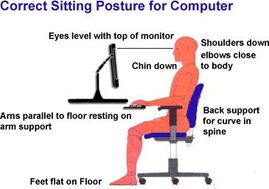 Correct sitting posture, DM for Pic Credit. Correct sitting posture, DM for Pic Credit.
Honorable Mentions for Area Specific Issues
This is just what I've come across that has worked for me. I'm not a doctor or medical provider, and I do recommend you speak with them before starting any kind of supplement or making any significant change. And don't be afraid to do your own research! Most importantly, know there's nothing wrong with you. You haven't failed and you are deserving of whatever adventure you want to chase. How do you deal with pain/inflammation without NSAIDS? Comment below or email me here! |
Archives
March 2021
Categories
All
|
